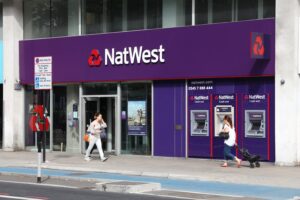
Natwest has beaten profit expectations during the first three months of this year.
NatWest Group, which includes Royal Bank of Scotland and Ulster Bank, recorded a pretax profit of £1.8bn in the three months ending 31 March.
The total comes in ahead of analysts’ expectations of £1.6bn for the quarter and ahead of the £1.2bn during the same period last year.
It follows rival bank Barclays posted better-than-expected profits drive by US credit cards and higher interest rates, and its largest in at least 12 years.
Group revenues during the quarter totalled £3.9bn compared to £3.01bn the previous year and an expected £3.76bn; net profit was £1.28bn compared to £841m and ahead of the consensus of £1.07 billion.
Natwest has made a modest provision of £70m towards bad debt for the quarter, as compared to a release of £38m this time last year.
Natwest sees £1bn deposits withdrawn
Natwest said £1bn was withdrawn from customer deposits as a result of higher tax payments, competition for better savings rates and market volatility.
After cutting back on investment banking following the financial crisis, Natwest makes the majority of its profit from retail banking making it particularly sensitive to changing interest rates.
Natwest banking crisis Natwest’s results come as the banking sector faces intense scrutiny in the wake of Silicon Valley Bank’s (SVB) collapse.
While banks in the UK have mostly been insulated from the banking panic, the continuing travails of First Republic have raised concerns that the global banking sector is not out of the woods yet.
Natwest results are ‘what the doctor ordered’
Richard Hunter, head of markets at interactive investor, said when set against the wider banking turmoil of recent months
Natwest’s results were: “solid and dependable, if a little unexciting, performance which NatWest has delivered is just what the doctor ordered for more risk-averse investors”.
He added that the current economic backdrop is one to which the bank is suited, being largely exposed to a UK economy where rising interest rates are in force and where bad debts remain low and containable. At the same time, the group’s lending and mortgage growth in particular remains strong, and higher trading volumes have made a notable impact.
Hunter said Natwest shares (NWG) had dipped by 11 per cent over the last three months, and were last down 5.55 per cent at 257.10p.
Hunter added: “The rather negative reaction to the numbers in early trade could contain an element of disappointment on customer balances and unchanged outlook guidance.
“However, the share price has still managed to post a gain of 14 per cent over the last year, which compares to a rise of 4.3 per cent for the wider FTSE100.
“The strength and stability of the group is one which has been attracting investors given a generally difficult backdrop, and the market consensus of the shares as a buy is reflects investor belief in the bank’s ability to weather the current economic turbulence.”
Read more:
Natwest customers withdraw £1bn as cost of living and tax bills bite





